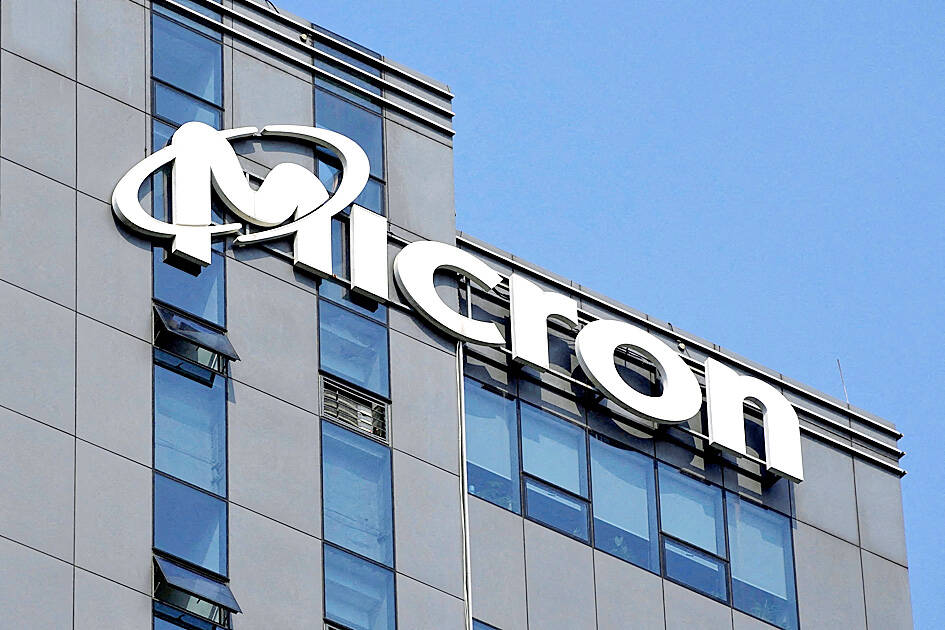Japan’s government approved as much as ¥192 billion (US$1.28 billion) in subsidies for Micron Technology Inc’s Hiroshima factory, part of Tokyo’s efforts to bolster next-generation chip production at home.
The subsidies will help the Boise, Idaho-based company install Dutch firm ASML Holding NV’s extreme ultraviolet lithography equipment to make advanced chips, Japanese Minister of Economy, Trade and Industry Yasutoshi Nishimura said yesterday.
Such chips would be essential to power generative artificial intelligence, data centers and self-driving technology, he said.

Photo: Reuters
The Japanese government’s support covers almost 40 percent of Micron’s investment plans in Japan.
“The market is rough now, but it’s essential that we invest in times like these,” Nishimura told a news conference, referring to an industry-wide slump that has weighed on the US company’s earnings. “This is to secure a supply of cutting-edge chips that Japan will need for its future economic security.”
The approval marks a win for Micron as it grapples with uncertainty in China, one of its largest markets and where the company faces an ongoing probe by regulators. Micron has said the investigation put half of its China sales at risk.
Tokyo has set aside a maximum ¥167 billion to help cover Micron’s production costs and as much as ¥25 billion for development costs, Nishimura said.
Micron has said it plans to spend about ¥500 billion and produce what it calls one-gamma technology in Japan.
Tokyo’s support comes as similar efforts by the US to bolster domestic chip production are getting stymied by labor issues and slow delivery of promised funding.
The world’s biggest chipmaker, Taiwan Semiconductor Manufacturing Co (TSMC, 台積電), said in July that it was delaying the start of production at its planned Arizona factory to 2025.
Construction at a TSMC plant in southern Japan has been proceeding relatively smoothly through round-the-clock shifts and a government pledge to pay for almost half the cost.
Japanese Prime Minister Fumio Kishida’s administration has earmarked billions of dollars in subsidies in a bid to triple domestic production of chips by 2030 and help an aging Japan regain some of its former leadership in tech.
It is in talks about support for a second TSMC plant in Japan, and it is funding homegrown Rapidus Corp to make the country’s own cutting-edge chips.
Micron, which bought former Japanese DRAM maker Elpida Memory Inc’s operations in 2013, said that it employs more than 4,000 engineers and technicians in Japan.
“If there are good jobs, young people will stay closer to home and create positive ripple effects for the regional economy,” Nishimura said. “We hope this will also help nurture chip-related talent.”

Intel Corp chief executive officer Lip-Bu Tan (陳立武) is expected to meet with Taiwanese suppliers next month in conjunction with the opening of the Computex Taipei trade show, supply chain sources said on Monday. The visit, the first for Tan to Taiwan since assuming his new post last month, would be aimed at enhancing Intel’s ties with suppliers in Taiwan as he attempts to help turn around the struggling US chipmaker, the sources said. Tan is to hold a banquet to celebrate Intel’s 40-year presence in Taiwan before Computex opens on May 20 and invite dozens of Taiwanese suppliers to exchange views

Application-specific integrated circuit designer Faraday Technology Corp (智原) yesterday said that although revenue this quarter would decline 30 percent from last quarter, it retained its full-year forecast of revenue growth of 100 percent. The company attributed the quarterly drop to a slowdown in customers’ production of chips using Faraday’s advanced packaging technology. The company is still confident about its revenue growth this year, given its strong “design-win” — or the projects it won to help customers design their chips, Faraday president Steve Wang (王國雍) told an online earnings conference. “The design-win this year is better than we expected. We believe we will win

Chizuko Kimura has become the first female sushi chef in the world to win a Michelin star, fulfilling a promise she made to her dying husband to continue his legacy. The 54-year-old Japanese chef regained the Michelin star her late husband, Shunei Kimura, won three years ago for their Sushi Shunei restaurant in Paris. For Shunei Kimura, the star was a dream come true. However, the joy was short-lived. He died from cancer just three months later in June 2022. He was 65. The following year, the restaurant in the heart of Montmartre lost its star rating. Chizuko Kimura insisted that the new star is still down

While China’s leaders use their economic and political might to fight US President Donald Trump’s trade war “to the end,” its army of social media soldiers are embarking on a more humorous campaign online. Trump’s tariff blitz has seen Washington and Beijing impose eye-watering duties on imports from the other, fanning a standoff between the economic superpowers that has sparked global recession fears and sent markets into a tailspin. Trump says his policy is a response to years of being “ripped off” by other countries and aims to bring manufacturing to the US, forcing companies to employ US workers. However, China’s online warriors